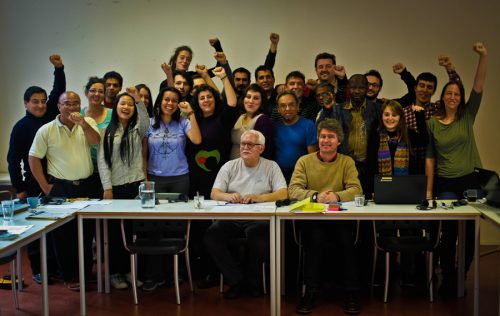The second 'ecosocialist school' organized by the IIRE was a successful, truly international meeting.
The final large activity of the IIRE in 2013 was the second 'ecosocialist school'. Each year, we organize several educational activities, the largest of which is a three-week school for political activists. Reflecting the increasing importance of the ecological question for progressive activists, we drew up a new program for our three-week school a couple of years ago and renamed it the 'ecosocialist school'.
Two dozen participants took part in the course that consisted of three modules of one week. The first module focused on an analysis of the different aspects of the capitalist crisis and the second week on aspects of the ecological question, such as climate change and food shortages. The school closed by discussing social movements in different regions of the world and the attempts of activists to develop strategies for changing the world.
Most of the participants came from the Global South, from Latin America, Africa and South Asia, but the school also included European participants. Reflecting a new growth of our contacts in Latin America, the participation from this region was this year especially large. The economic crisis in the euro-zone, as well as the political turbulence in the Arab world and the evolution of the Latin American left often formed the background for discussions among participants and with lecturers.
The discussions also reflected the variety in political experience of the participants, from youth-activists and trade-unionists to environmental activists and activists for the cancellation of illegitimate debt.
As diverse as the group was, many questions were shared broadly among the participants. Five years after the outbreak of the economic crisis, the left is struggling to organize a response. Meanwhile, all the research confirms a deepening of the climate crisis.
The school focused on how we can draw lessons from the large struggles that erupted since 2011, such as Occupy, the Arab revolts and others, to answer such challenges and find clues on how to create a sustained movement.
Many participants indicated they found the school an unique opportunity to discuss such questions in a truly international setting and said that their activism back home will be strengthened by the experience.
We feel that the increasingly diversity of participants in our courses and the common search for answers in their own small way point to the possibility to building a truly global movement. The often very positive feedback of the participants and the enthusiasm to continue cooperating will help us to continue to improve our courses.

